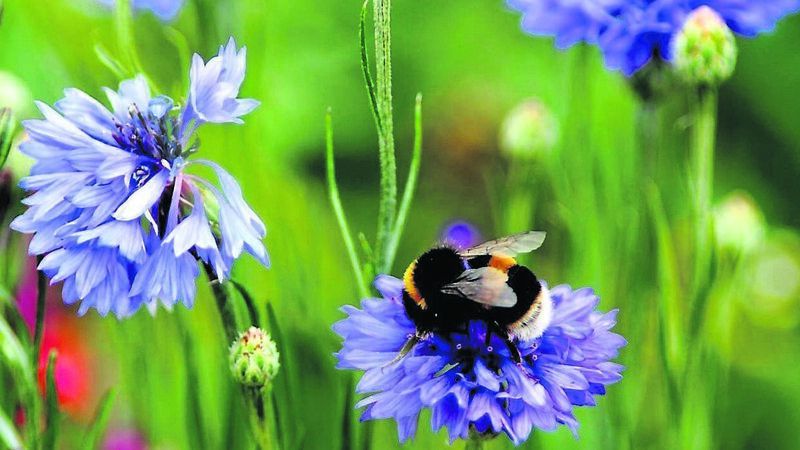Where did all the insects, bees and butterflies buzz off to?

I spent a couple of hours in that welcome sunshine last Sunday toiling away and cleaning my car - not because I wanted to pose around the neighbourhood, shades on, elbow perched on the window, but because my NCT was due.
NCT waiting rooms are a bit like maternity wards of old, before fellas were allowed by the bedside, with mostly men pacing up and down and anxiously waiting to hear if it’s going to be good news.
“It passed!” is the 2024 equivalent of “It’s a boy/girl!” Except the modern result is far cheaper, and you get to sleep like a baby yourself that night.
I’m not one of those regular Sunday car-washers by any stretch, and it was only yesterday, five days later, that I noticed something odd from my car-cleaning labours: My windscreen was still gleaming.
Five days of high summer, of reasonably decent and dry weather, and of several mainly rural journeys, and there was nary an insect squashed on the car window.
David Attenborough would have had a field day examining the remnants of ladybirds, flies, gnats, bees, and butterflies splattered across the window.
Where have they all gone? Have they evolved to dodge cars, or is something more sinister afoot?
Because it’s not just the spotless car windscreens that are causing disquiet.
I have a daily rural walk up beside my house, and even on the rare days when we have had a bit of sun this summer, it has been almost eerily free of insect life.
No buzz of bees or hum of dragonflies, very few fluttering butterflies. Where are the ladybirds? Even the pesky biting insects are few and far between.
Is it the same where you are? Have you noticed a dearth of insect life this summer? Not just compared to days of our childhood, but to last year and the year before?
I can only speak anecdotally, but even in the relative sunshine and warmth of the past week, the lack of a buzz and a hum around the place has been starkly noticeable.
It’s logical to speculate that this may be the reason why there seem to be fewer birds around the place too.
Not so long ago, there were dozens of swallows around my place. This year, I have hardly seen them.
But a little research on swallows - summer visitors here from South Africa - suggests the issue may be much more global.
A few years ago, Birdwatch Ireland said swallow numbers were in decline here because of a number of factors, including the widening of the Sahara where they cross every year, wetter Irish summers, and humans hunting them in countries like Malta and Cyprus.
Could large reductions in their diet of insects also be putting them off - or indeed killing them off?
Similar worrying research on insects suggests their numbers are declining at an alarming rate, amid a perfect storm of environmental, ecological, and globalisation factors that has been dubbed ‘insectageddon’.
Specific factors in Ireland that could be reducing their numbers include pesticides and chemicals, and the destruction of their natural habitats.
Heightened awareness and various initiatives in recent years appear to be failing to turn the tide.
A few years ago, we allocated an area of our lawn to be returned to the wild, and it is now an overgrown mini-wilderness that ought to be a paradise for insects.
But a walk through it one evening this week failed to find any significant signs of life.
Ireland has 99 species of bee, but more than half of these are in decline and a third are threatened with extinction here.
Recently, a study in Northern Ireland revealed that the abundance of flying insects sampled on vehicle number plates had fallen by 54% since 2021. (It isn’t lost on me that car number plates and windscreens are strangely apt objects to use as indicators of ecological collapse...)
A study in Germany found that three-quarters of flying insects had vanished there in the last 27 years. Shockingly, that research was carried out on nature reserves, which are meant to be protected zones, so heaven only knows how bad the situation is in the real wild.
The big concern is that, while the impact of, say, climate change, is open to lots of interpretation, the effects of a huge reduction in insect numbers are blindingly obvious. Dr Tomás Murray, Senior Ecologist with the National Biodiversity Data Centre, summed it up best.
“Given that insects outrank all other animals in terms of species, numbers and biomass both worldwide and in Ireland, and that along with other invertebrates they are our pollinators, predators, decomposers, soil engineers, and simply food for other animals, changes in their diversity and abundance can have profound consequences for how our landscapes function and human wellbeing,” he said.
Luckily, they are hardy little buggers, adept at surviving everything Earth has thrown at them for million of years. Let’s hope they haven’t met their match in mankind.
Have you noticed a shortage of insects? Email letters@theecho.ie







 App?
App?




